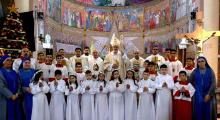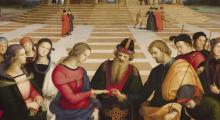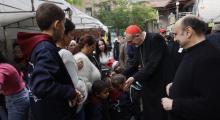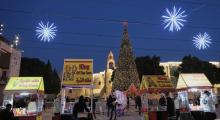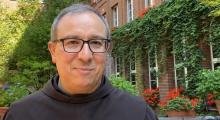Issued by the Catholic Center for Studies and Media - Jordan. Editor-in-chief Fr. Rif'at Bader - موقع أبونا abouna.org
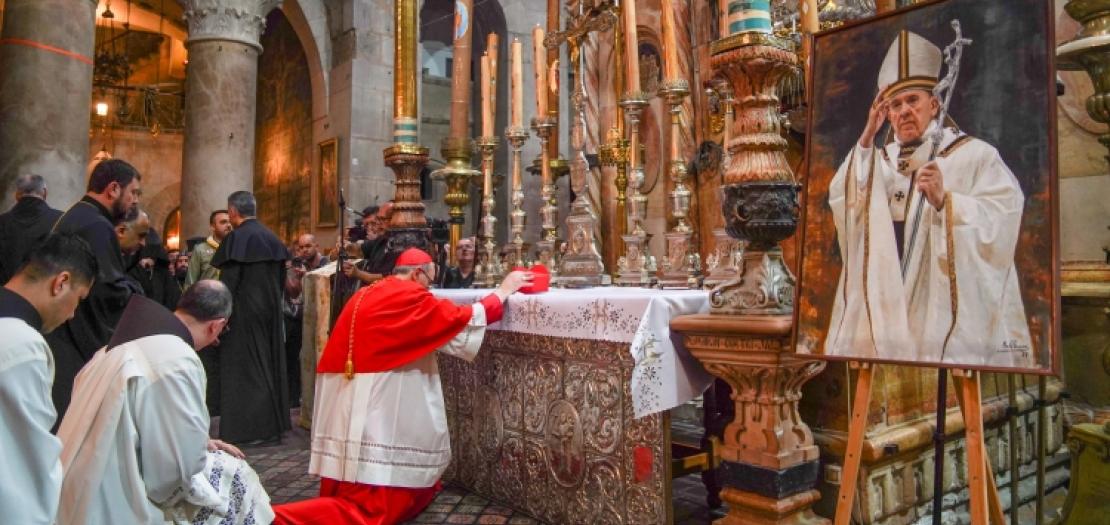
The celebrations in the Holy Land in suffrage of Pope Francis represented a moment of deep union between the local faithful and the Universal Church in remembrance of the Holy Father. The celebrations took place on different days and in different holy places, including the Basilica of Gethsemane, the Basilica of the Annunciation in Nazareth and the Basilica of the Nativity in Bethlehem.
Of particular significance, in addition to the presence of the local faithful and some pilgrims, was the closeness and presence of the Eastern and Protestant Churches. A tangible sign of the message Pope Francis has left with his pontificate, which can be summarized by the title of his Encyclical: Brothers All.
April 25: Mass at Gethsemane
The first celebration, following the one at the Holy Sepulcher, was the solemn mass celebrated at the Basilica of Gethsemane in Jerusalem, on the Mount of Olives. The ceremony was attended, in addition to Franciscan friars from the Custody of the Holy Land, by diplomatic representatives, pilgrims and local faithful, united in remembrance of the Pontiff. The celebration was presided over by Archbishop Adolfo Tito Yllana, appointed by Holy Father Francis - last June 3 - Apostolic Nuncio to Israel and Cyprus, as well as Apostolic Delegate to Jerusalem and Palestine.
During his homily, the Nuncio fondly recalled Pope Francis, noting: "Pope Francis thought that faith in the resurrection implies a constant commitment to the least of these, in God's time. God gathers all the discarded stones and transforms them, like Jesus, into cornerstones.
Pope Francis was a pope of dialogue, who generously committed himself to promoting dialogue between religions and faiths, first and foremost with Judaism and Islam.
The Word of God that we are called to proclaim helps us to discover other aspects of the figure of the late Pope Francis, without any pretension to exhaust his portrait."
April 26: The Mass in Bethlehem
The faithful of Bethlehem also gathered in an embrace of faith around the Holy Father on the same day as his funeral in Rome. The celebration in the Basilica of the Nativity was presided over by Bishop William Shomali, Vicar General and Patriarchal Vicar for Jerusalem and Palestine.
The celebration was attended by local scouts, numerous faithful and civil authorities, as well as representatives of the Eastern and Protestant Churches in the city of Bethlehem.
In his homily, the Bishop addressed words of gratitude for the pontificate of the Holy Father Francis and expressed his appreciation for the presence of all, whose participation was a profound sign of unity, testifying to how much the Pope had touched the hearts of many.
He went on to say:
"The Pope invoked peace in the world. In his last speech, he mentioned every area of conflict around the globe, paying special attention to the ongoing war in Gaza." In this time of great challenges the world is facing, Bishop Shomali emphasized how the Pope has never forgotten those living in difficult conditions. He noted, "The greatest example is Gaza. Every evening, punctually at 7:00 p.m., His Holiness would phone the priests and nuns of the Gaza parish to inquire about the conditions of the people. He knew in detail what was happening."
April 28: Mass in Nazareth
The liturgy was presided over by Archbishop Rafiq Nahra, Vicar of the Latin Patriarchate in the Galilee, and concelebrated by Fr. Wojciech Bołoz, guardian and Rector of the Basilica of the Annunciation and Shrine of the Holy Family in Nazareth, and Fr. Ibrahim Sabbagh, pastor of Nazareth. Also present were delegations from the Orthodox and Evangelical Churches, numerous religious communities and numerous faithful.
During his homily, Bishop Nahra offered a reflection on the Pope's personal aspect, which focused not only on his role as Pontiff, but on who he was as a man: a man of deep humility and compassion. He went on to emphasize the importance of coming together, even from different Christian denominations, to pray for him, highlighting Pope Francis' constant message of unity and mercy.
Pope Francis is remembered as the Pope of the Poor and the Pope of Mercy. From the beginning of his pontificate, choosing the name "Francis" indicated his dedication to peace, the poor and simplicity, inspired by St. Francis of Assisi. His life has been marked by a deep concern for the marginalized and a vision of the Church not as a place of judgment but as a field hospital, a place where wounded souls find healing.
April 29: Custos' remembrance at Mass at St. Savior's
The celebration at St. Savior's Convent in Jerusalem was presided over by the Custos of the Holy Land, Fr. Francesco Patton.
As in the Mass at the Holy Sepulcher, the Custos in his homily recalled one of the Pontiff's most emblematic catechesis during the Year of Mercy, in which he stated, "There is neither a saint without a past, nor a sinner without a future." With these words, Pope Francis defined the Church as a community not of the perfect, but of sinners on the way. His pontificate has been traversed by this merciful gaze, always turned toward the last, the marginalized, those he called "discarded."
The Custos invited us to look to Jesus crucified: even in the most difficult moments of the pandemic, Pope Francis had pointed to the Crucifix as a reference for understanding God. Not a God who judges, but one who embraces, forgives and gives himself in silence. In the Resurrection, he explained, lies the transforming power of God's love: fear becomes trust, anguish is transformed into hope.
The Custos acknowledged that Pope Francis' proclamation could be uncomfortable, especially when he spoke of peace, the environment, welcome or fraternity with a radicalism that challenged our habits. However, he invited us to gratefully guard the path the Pope has indicated, which is rich in humanity and fidelity to the Gospel.


